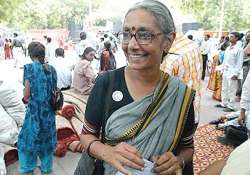Aruna Roy leaves National Advisory Council
New Delhi, May 29: Noted social rights activist Aruna Roy has decided to leave the National Advisory Council (NAC). Her letter of resignation has been accepted by NAC chairperson Sonia Gandhi, who also heads the

New Delhi, May 29: Noted social rights activist Aruna Roy has decided to leave the National Advisory Council (NAC). Her letter of resignation has been accepted by NAC chairperson Sonia Gandhi, who also heads the United Progressive Alliance (UPA).
The task of the NAC is to provide inputs in the formulation of policy by the government, and to provide support to the government in legislative business.
In her letter to Sonia Gandhi, Roy listed differences with the government, specially over the refusal to give minimum wages to beneficiaries under the Mahatma Gandhi Rural Employment Guarantee Scheme (MGNREGS).
The noted social activist said that despite its contribution to changing the lives of the rural poor, implementation of this crucial flagship programme remains a challenge.
"There is a huge group of MGNREGS beneficiaries who are critical, but supportive of the law. They are losing public and political space to a small, vocal, and powerful minority determined to undermine the basic objectives of the MGNREGS," Roy said in her letter.
"This is in continuation of the conversation we had some time ago, when I had requested that I not be considered for another term in the NAC. I am grateful for your accepting my request, while assuring you continued support to campaigns for social sector causes being taken up outside the NAC," Roy wrote.
She said that it was "extremely unfortunate" that the prime minister rejected the NAC recommendations on payment of minimum wages to MGNREGS workers and chose instead to appeal against the Karnataka High Court judgment ordering the payment of minimum wages to MGNREGS workers.
"Even more distressing is the government's refusal to pay minimum wages even after the Supreme Court refused to stay the Karnataka High Court judgment. It is difficult to understand how a country like India can deny payment of minimum wages and still make claims of inclusive growth," Roy said.
Listing the achievements of the NAC, Roy said: "It is a matter of great significance that the NAC has approved a pre-legislative consultative process and will send it to government for necessary action. In my opinion, the NAC is itself a kind of pre-legislative body that has benefited immensely from the public consultations it has held."
The functioning of the Justice J.S. Verma Committee, and its celebrated report in the aftermath of the Dec 16 gang-rape in Delhi, were also an outcome of a pre-legislative consultative process, Roy noted, hoping that the process of public consultation would become more robust.
Favouring immediate passage of the food security bill, Roy said: "Given the hunger and malnutrition scenario in the country, a food security bill should have been debated and passed by parliament by now."
In her letter accepting Roy's resignation, Sonia Gandhi said: "I respect your decision to move on from the National Advisory Council. I hope that we will continue to have the benefit of your wisdom and thoughts as a friend and supporter of NAC."
The task of the NAC is to provide inputs in the formulation of policy by the government, and to provide support to the government in legislative business.
In her letter to Sonia Gandhi, Roy listed differences with the government, specially over the refusal to give minimum wages to beneficiaries under the Mahatma Gandhi Rural Employment Guarantee Scheme (MGNREGS).
The noted social activist said that despite its contribution to changing the lives of the rural poor, implementation of this crucial flagship programme remains a challenge.
"There is a huge group of MGNREGS beneficiaries who are critical, but supportive of the law. They are losing public and political space to a small, vocal, and powerful minority determined to undermine the basic objectives of the MGNREGS," Roy said in her letter.
"This is in continuation of the conversation we had some time ago, when I had requested that I not be considered for another term in the NAC. I am grateful for your accepting my request, while assuring you continued support to campaigns for social sector causes being taken up outside the NAC," Roy wrote.
She said that it was "extremely unfortunate" that the prime minister rejected the NAC recommendations on payment of minimum wages to MGNREGS workers and chose instead to appeal against the Karnataka High Court judgment ordering the payment of minimum wages to MGNREGS workers.
"Even more distressing is the government's refusal to pay minimum wages even after the Supreme Court refused to stay the Karnataka High Court judgment. It is difficult to understand how a country like India can deny payment of minimum wages and still make claims of inclusive growth," Roy said.
Listing the achievements of the NAC, Roy said: "It is a matter of great significance that the NAC has approved a pre-legislative consultative process and will send it to government for necessary action. In my opinion, the NAC is itself a kind of pre-legislative body that has benefited immensely from the public consultations it has held."
The functioning of the Justice J.S. Verma Committee, and its celebrated report in the aftermath of the Dec 16 gang-rape in Delhi, were also an outcome of a pre-legislative consultative process, Roy noted, hoping that the process of public consultation would become more robust.
Favouring immediate passage of the food security bill, Roy said: "Given the hunger and malnutrition scenario in the country, a food security bill should have been debated and passed by parliament by now."
In her letter accepting Roy's resignation, Sonia Gandhi said: "I respect your decision to move on from the National Advisory Council. I hope that we will continue to have the benefit of your wisdom and thoughts as a friend and supporter of NAC."